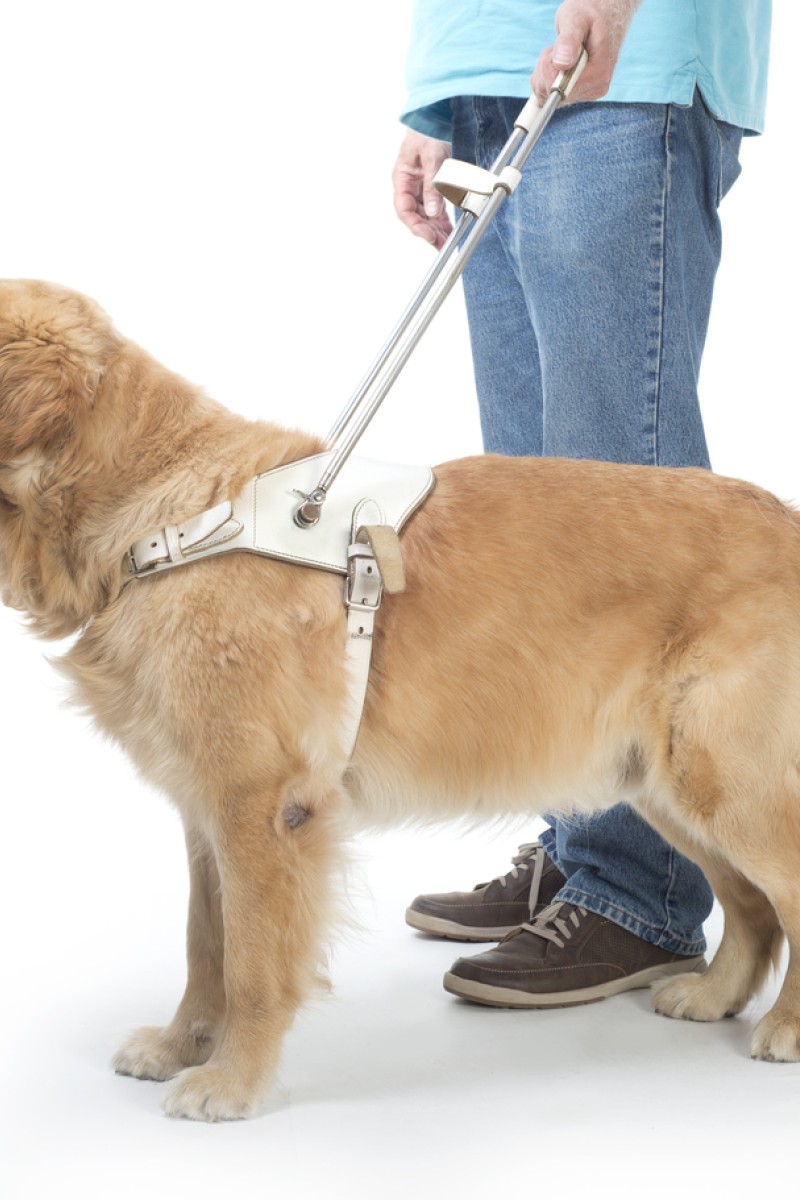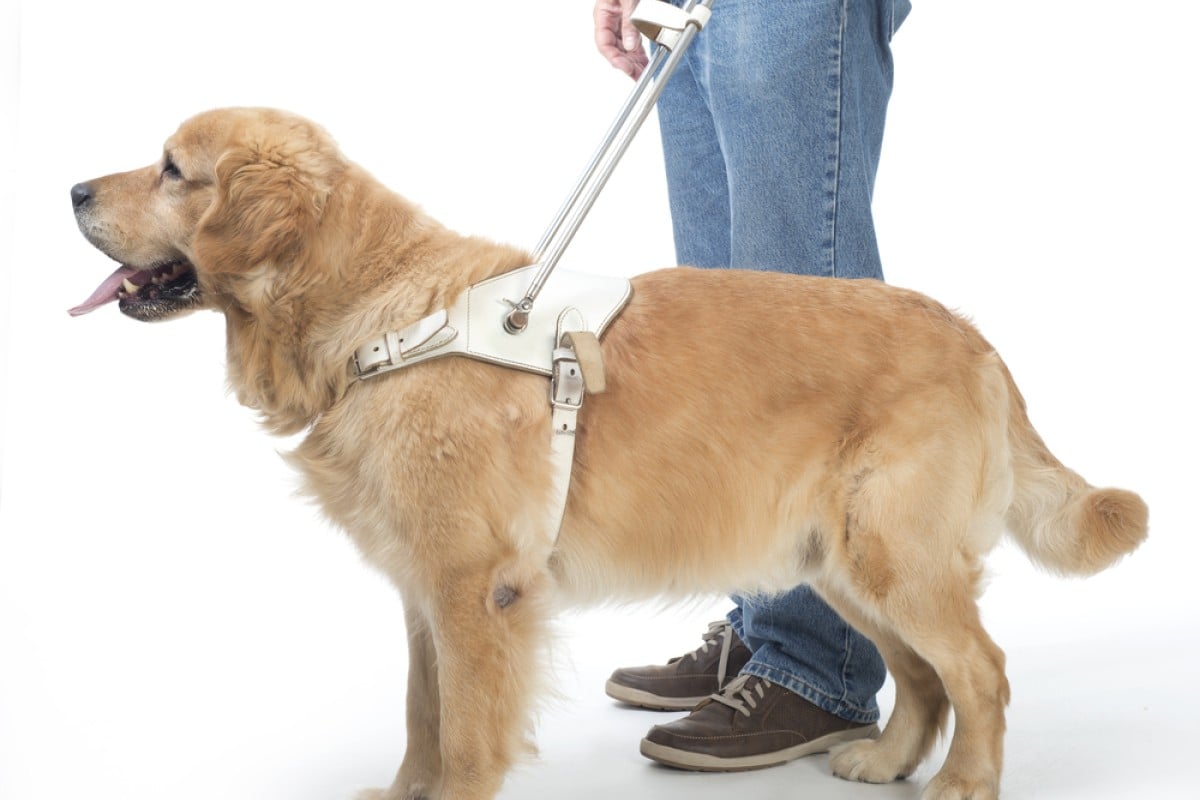
Young Post meets the Hong Kong Guide Dogs Association, and takes a walk with (a blind) man’s best friend
- A charity is helping blind people have more freedom and a better life with the help of guide dogs
- Take a walk with these furry friends and learn more about the organisation

Of the five senses – sight, hearing, taste, smell, and touch – the most important one is sight. We live in a visual world, deriving meaning from what is seen around us. Research estimates that 85 per cent of our perception, learning, understanding, and activities are done using vision. Our brains rely mostly on sight for many tasks, such as finding our way around, deciding if something is safe to eat, or to spot danger.
Imagine not having this amazing sense. Blind people have a greater chance of getting hurt by bumping into things, being hit by objects, and falling down. But while the loss of sight is a terrible tragedy, life can go on.
Young Post caught up with the Hong Kong Guide Dogs Association (HKGDA) to find out how this charity has been assisting the visually impaired (VI) lead a better life with the help of guide dogs.
Founded in 2011, the group provides the VI with guide dogs, and trains them in using the dogs safely and effectively.
“There are approximately 170,000 VI people living in Hong Kong at the moment,” says Andy Ho, executive director of HKGDA. “Our goal is to give 1 per cent of them guide dogs.”
To do that, they would need about 1,700 fully trained guide dogs. But at the moment there are only 12 fully trained guide dogs, and another 20 puppies that are currently in training.
Although almost any dog can become a guide dog, experience has shown the best suited breed for it is a Labrador and retriever cross, as they have the best temperament for this kind of work. They also generally have higher IQ and fewer health issues. About 80 per cent of all guide dogs around the world are Labrador-retriever crosses.
Puppies start training when they are seven to eight weeks old, and they take two years to fully train. All puppies are brought in from breeding centres in countries such as the UK, Australia, the US, or Taiwan.
“At the moment all puppies are kept in volunteer foster homes as there is no permanent breeding facilities that can accommodate puppies and dogs,” says Ho. But it’s tough to find foster homes for puppies in Hong Kong, as many homes are too small or do not allow pets.
That’s why, Ho says: “It’s very important for us to set up guide dog breeding facilities within Hong Kong, if we are to meet our goal of 1,700 guide dogs.”
As well as a breeding centre, Hong Kong will also need a permanent dog training facility, which would also help with getting dog numbers up quicker, and provide better controlled training.
Right now all dogs are trained on the city streets and public transportation, and at shopping malls and restaurants. But during the summer months it is so hot that dogs can suffer from heat exhaustion if they’re not taken care of properly. To avoid this, most training starts at 5am during the summer, before it gets too hot. A training centre would help both dogs and trainers, as they would be able to train in an air-conditioned space for longer sessions each day.
So you want to be vet? The realities of this difficult career path
Cherrie Wu and Garrick Poon spent the last three years in the UK learning to become certified guide dog mobility trainers. “On the first day of class, all the students were blind folded and given long canes, and were told to navigate around a park” recalls Wu. “We kept bumping our heads on things, and got easily lost and disoriented. It was really quite frightening. Then we did the exercise again, but instead of a cane we were given guide dogs, which took us around the park with no problem!”
A guide dog is much better because they can help the VI avoid objects that cannot be felt with a cane. Dogs are also trained to find and bring objects upon the VI’s command.
And they truly offer another pair of eyes in some difficult situations.
“With the growing popularity of electric cars – which are virtually silent – it has become more dangerous for the VI to cross the roads,” says Ho. “Dogs are able to visually identity such dangers and are able to avoid such obstacles.”
It’s not just the dogs who need training – people need a lot of training, too. “As well as training dogs, we must also be counsellors,” says Poon. “We spend a lot of time counselling the VI with their personal issues and fears.”
People that lose their sight later on in life have a much harder time to adjusting to their disability. The feeling of complete isolation is a big problem, and many VI feel very lonely. Part of this comes from a lack of awareness among Hongkongers, and some people still have outdated superstitions.
For example, there is an old Chinese saying: “If you are hit with a white pole, you will receive ten years of bad luck.” So when the VI are out walking, some people will deliberately step on their white cane, or kick it away.
But when the VI uses a guide dog, the public has a very different reaction to them. People feel like the VI are more approachable, and ask questions about the dog. They are also more likely to offer help.
“In a way guide dogs act as a bridge between the VI and the community,” says Poon.
The HKGDA tries to make sure that the each person gets the dog that is right for them. There are many factors considered before a dog is given, such as location, environment, space, and most importantly, whether the dog’s personality is compatible with its new master. These assessments take time, so there is six- to 12-month wait list to get a guide dog.
When a match is finally found, each dog receives a lifetime supply of dog food from Hills, and HK$4,000 a year for upkeep, vet bills and medication.
It’s no surprise that many VI build a very strong bond with their guide dogs. They are much happier, and more confident to leave their homes and explore the world around them. The guide dogs really improve the lives of the VI, physically as well as mentally.
To increase public awareness in Hong Kong, HKGDA will run weekly public seminars to educated the general public and schools about the benefits of guide dogs.
